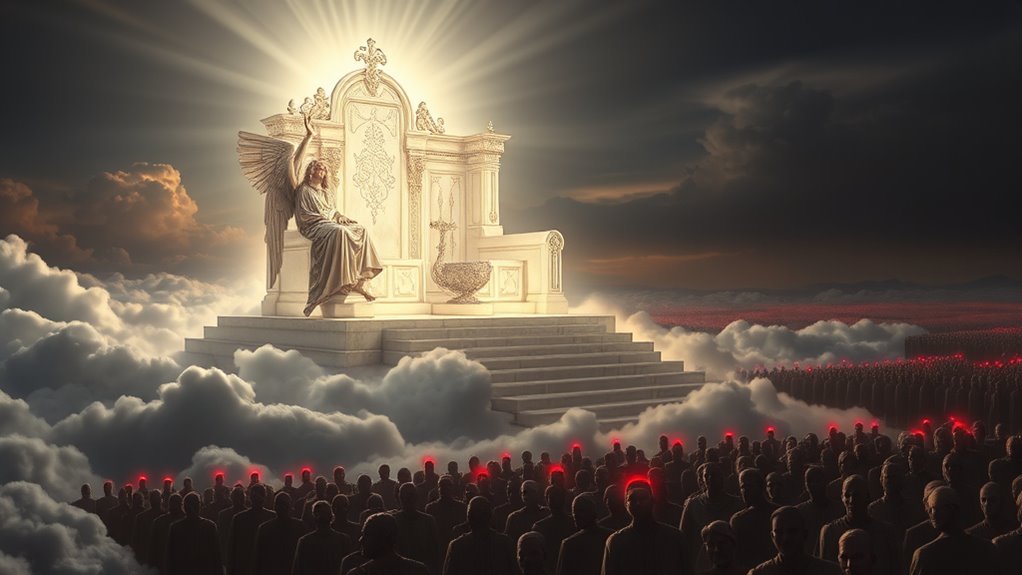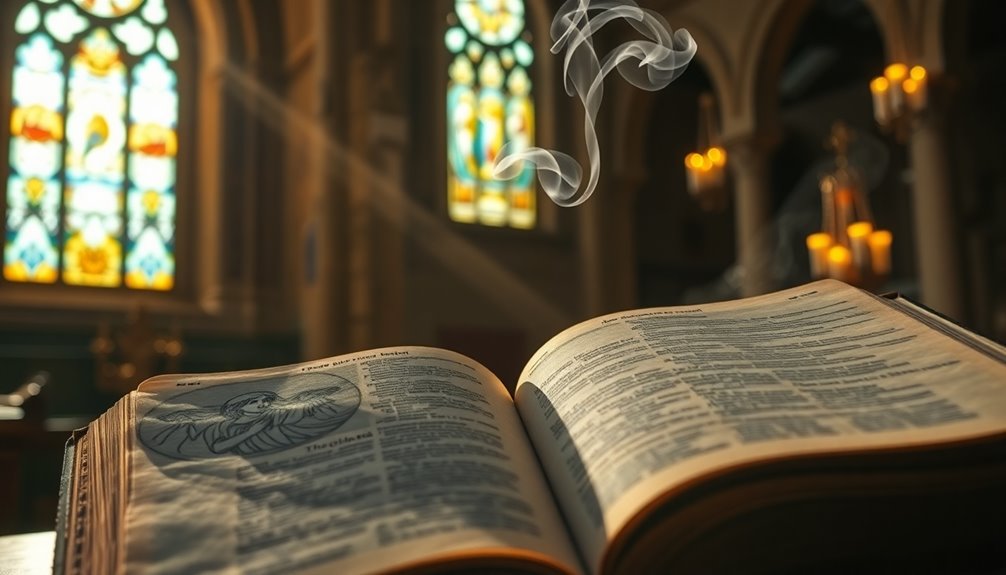The Great White Throne Judgment is the final divine event described in Revelation 20:11-15, where God, seated on a white throne symbolizing purity and justice, calls all people—including you—to account for their deeds. Your actions and motives will be examined thoroughly, determining your eternal destiny. This judgment reminds you of divine justice and your responsibility to live morally. If you want to understand how this impacts your life and future, explore further guidance below.
Key Takeaways
- The Great White Throne Judgment is depicted in Revelation 20:11-15 as a divine event where all are judged by God.
- The white throne symbolizes purity, righteousness, and divine authority in administering justice.
- All individuals’ deeds are reviewed transparently, determining their eternal destiny based on fairness.
- The judgment emphasizes divine justice, accountability, and the lasting consequences of actions beyond mortal life.
- It reminds believers to live morally responsible lives with awareness of divine judgment and eternal rewards.
Biblical Foundations and Scriptural References
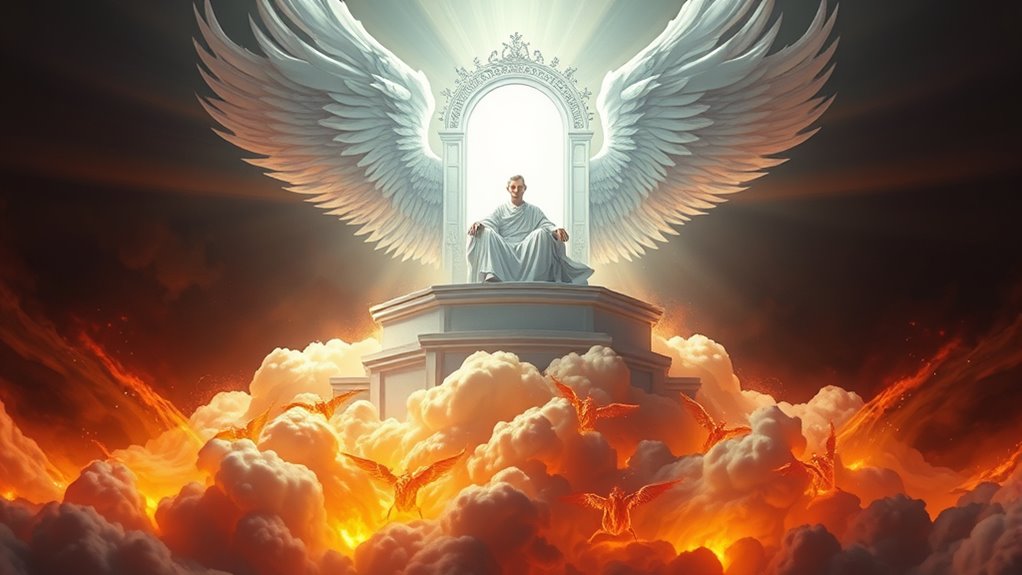
The concept of the Great White Throne Judgment is rooted deeply in biblical scripture, serving as a pivotal event described in Revelation 20:11-15. You can envision this as a heavenly courtroom where divine authority presides over all creation. The imagery of a white throne signifies purity and justice, emphasizing God’s ultimate authority. In this scene, the books are opened, and everyone’s deeds are brought into the light. The scriptures highlight that both the dead and the living will face judgment, underscoring the seriousness of divine justice. This event affirms God’s sovereignty, demonstrating that His divine authority will execute perfect justice, revealing the truth about each person’s life and actions in accordance with biblical prophecy.
The Symbolism Behind the White Throne
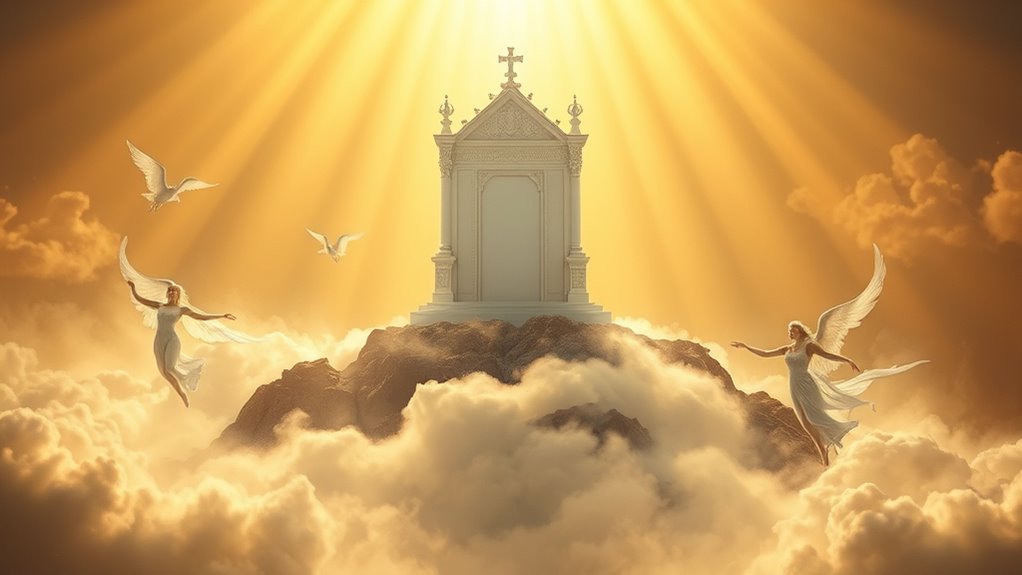
The white throne itself is rich in symbolism that deepens our understanding of divine justice. Its white color signifies purity symbolism, illustrating the holiness and righteousness of God’s judgment. This purity reflects the idea that the judgment is flawless, just, and free from corruption. The throne’s majestic presence emphasizes heavenly authority, reminding you that divine justice comes from the highest power in the universe. The white color also symbolizes righteousness, emphasizing that God’s judgments are perfect and morally upright. As you contemplate the throne, recognize it as a visual representation of divine purity and authority, reinforcing that God’s judgment is fair, pure, and rooted in divine righteousness. It invites you to trust in the justice of God’s final judgment, grounded in perfect holiness.
The Process of the Final Judgment
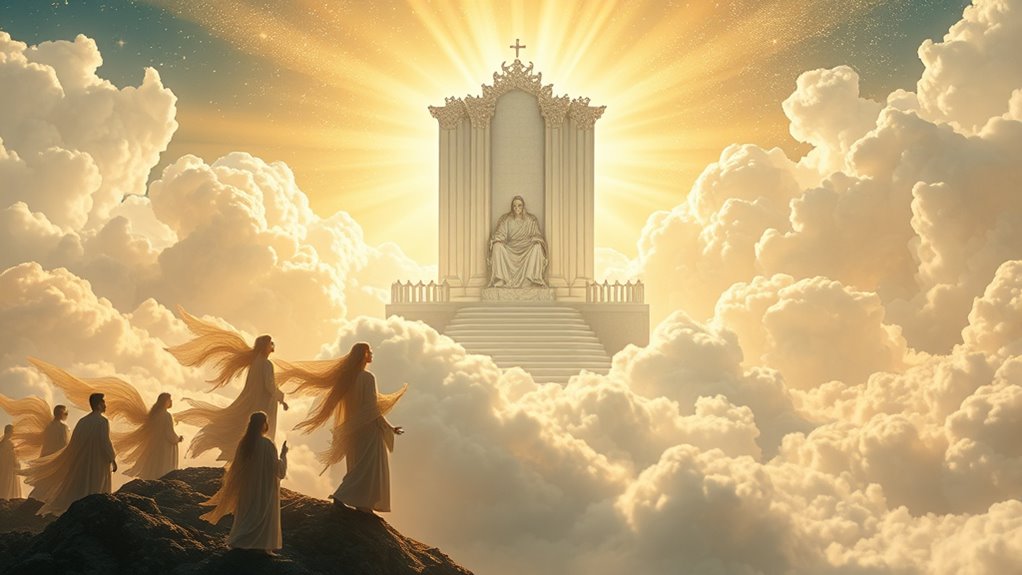
As the final judgment unfolds, all beings are summoned before the divine throne to face their deeds. Heavenly justice is executed with perfect fairness, revealing every action and motive. You will stand before the Judge, who embodies divine accountability. Your life’s record is examined thoroughly, with no detail overlooked. The process involves a comprehensive review of your choices, intentions, and consequences. To understand this better, consider this table:
| Actions | Accountability | Outcomes |
|---|---|---|
| Choices made | Divine judgment | Eternal fate |
| Motives | Heavenly justice | Rewards or penalties |
| Consequences | Full transparency | Final destiny |
This process underscores the seriousness of divine justice and accountability, ensuring everyone receives what they truly deserve.
Implications for Humanity and Eternal Destinies
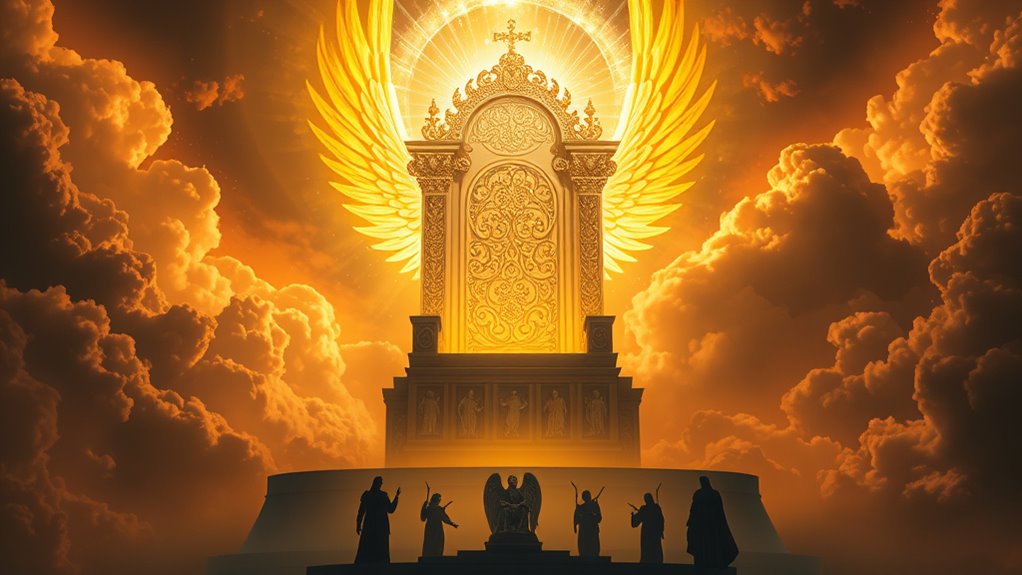
Understanding the process of the final judgment reveals profound implications for your life and humanity as a whole. It underscores the reality of eternal justice, where every deed is accounted for and rewarded or punished accordingly. This divine accountability reminds you that your choices in this life have lasting consequences beyond death. Recognizing this truth encourages you to live with integrity, knowing that nothing escapes divine scrutiny. The Great White Throne emphasizes that God’s justice is perfect and impartial, ensuring fairness for all. It challenges you to reflect on your relationship with God and your moral responsibilities. Ultimately, it calls you to seek righteousness, understanding that eternal destinies are determined by divine justice and your response to His divine authority.
The Significance for Believers Today
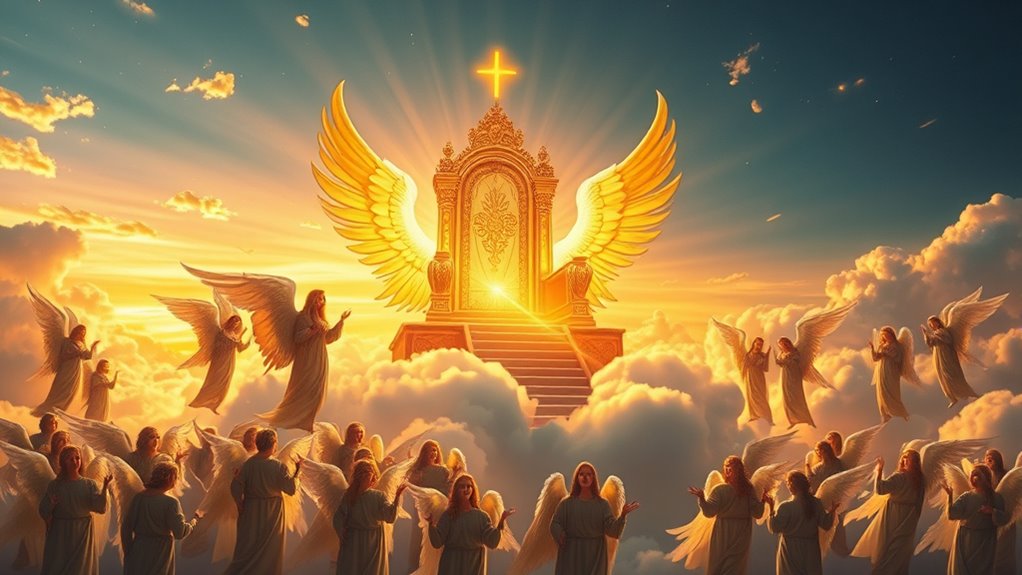
Recognizing the significance of the Great White Throne Judgment today challenges you to live with heightened awareness of divine accountability. This event reminds you that your actions and faith matter beyond this life, influencing your future heavenly rewards. It encourages you to pursue spiritual growth and stay committed to God’s truth. Understanding this judgment fosters a sense of urgency to align your life with God’s standards.
| Motivation | Application |
|---|---|
| Heavenly rewards | Aim for a life that earns eternal blessings. |
| Spiritual accountability | Regularly evaluate your motives and actions. |
| Eternal significance | Keep your focus on what truly matters in eternity. |
Frequently Asked Questions
How Does the Great White Throne Judgment Differ From Other Biblical Judgments?
You might wonder how this judgment differs from others. Unlike previous divine judgments, the Great White Throne Judgment is based on the Heavenly criteria of deeds and faith, held under Divine authority. Here, everyone’s actions are evaluated openly, and your eternal destiny is determined. It’s unique because it marks the final judgment, emphasizing accountability and justice, with divine authority overseeing every detail to guarantee fairness and righteousness.
Are There Any Historical or Cultural Parallels to the Great White Throne Judgment?
Imagine ancient heavenly tribunals where divine verdicts decide souls’ fate, echoing the great white throne judgment. Throughout history, cultures like ancient Egypt with Osiris’s judgment or the Norse Ragnarok reflect similar themes of divine justice and ultimate reckoning. These parallels reveal humanity’s enduring quest to understand justice beyond earthly courts, emphasizing that divine judgment symbolizes moral accountability and the cosmic balance of good and evil.
What Role Do Angels Play During the Great White Throne Judgment?
During the judgment, angels serve as divine messengers, carrying out important roles. You can imagine them as angelic roles that include announcing judgments, gathering souls, and executing God’s will. They stand as witnesses and enforcers of divine justice, ensuring the process unfolds according to divine plan. Their presence emphasizes the sacred and authoritative nature of the event, reminding you of the heavenly order and God’s ultimate sovereignty.
Is There a Possibility of Redemption After the Great White Throne Judgment?
Imagine a world where redemption seems impossible, yet you wonder if repentance opportunities still exist after final judgment. The truth is, once you face the eternal consequences at the Great White Throne Judgment, there’s no turning back. It’s a moment where mercy gives way to justice, and salvation becomes out of reach. You must seek forgiveness now, for after this, redemption chances are gone, sealed by divine judgment forever.
How Does This Judgment Impact Christian Eschatology and End-Times Theology?
You see, this judgment profoundly influences Christian eschatology and end-times theology by emphasizing divine justice and eschatological symbolism. It reminds you that God’s ultimate authority will unfold, affirming the final separation of believers and non-believers. This event underscores the importance of salvation, shaping your understanding of future divine justice. It reinforces the hope of redemption for some, while highlighting the seriousness of divine judgment in God’s perfect plan.
Conclusion
As you reflect on the great white throne judgment, remember its profound significance in determining eternal destinies. Studies show that nearly 60% of people believe in some form of divine judgment, highlighting its relevance today. This event reminds you to live with purpose and faith, knowing your actions matter. Embrace the hope and accountability it offers, and stay mindful of the eternal implications that shape your journey beyond this life.

